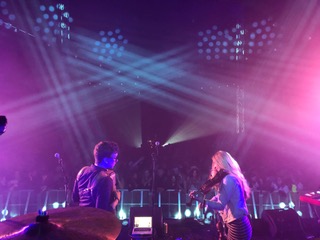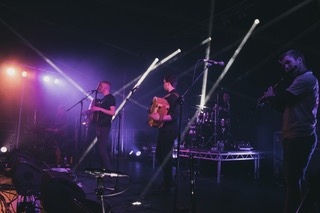Pàdruig Morrison, Uist

Tomorrow, I head off from Uist to perform at another music festival. A few weeks ago, I was at the incredible inaugural Beò festival, an all Gaelic music festival which took place in the south end of Skye. In a few weeks’ time, I will be at the Heb Celt Festival in Lewis, as well as Ceòlas and the Eilean Dorcha Festival in Uist. The west coast is now jumping with festivals all year. The more we have, the more it boosts our music and culture; the more we strengthen those, the more we strengthen our cultural identity.
Also taking place in July is the award winning Tiree Music Festival. Consider the island of Tiree: what is the island’s cultural value? Beware not to simply read that while interchanging ‘cultural value’ for ‘economic value’ or ‘tourism industry’. Tiree may have put more into the Gaelic and west coast music industry than any other island, in terms of its output of bands, musicians, and instrumental teachers, as well as a festival which has helped solidify a love for the music, the language, and the culture.
All of this is culturally priceless. That is part of what is seeing the Tiree community maintain a young demographic and encourage more young people to return, and now we see, amongst other things, Tiree Gin expanding and the island continuing to be a surfing hotspot.

Similarly Uist – which also has a Gin distillery – has a music college, summer schools, and festivals all year round, all embedded within a crofting heartland and statistically the highest Gaelic speaking islands in Scotland: culturally priceless. And the young people keep returning.
The same is happening, and will continue to happen, in other island communities. The sense of cultural identity is strong, and it is a strong link in the chain that will anchor young people to the place they are from.
I often try and promote a strengthening of Gaelic identity and island identity. However, there is an inherent strength and resilience to these identities that isn’t going anywhere.
It has been shown through research that identity formation often requires a sense of crisis – an open door with several paths, and a particular path has to be chosen. A crisis point for many is leaving home and moving to university – young Gaels go through this, with many leaving a strong Gaelic island community and going to the city.
This is nothing new. But why is it that today we are seeing more return to their island homes? And why are so many longing to come back only a few years after university?

From research into identity theory, we know that “the best way to achieve a stable and well-developed identity is to make one’s own choices based on previous experience.” Having a strong sense of Gaelic and island culture before going to university helps that particular identity become the strongest when one is having to choose which identity to hold onto the most. Young people returning, and wishing to return to our islands, is evidence of how strong this cultural identity is in people, and how it stays with them if they leave for the cities.
These music festivals have a crucial role to play, and indeed are helping our Gaelic/island cultural identities: “musical preferences are established during adolescence and youth, a period of identity construction, and are fairly stable over time.” Our festivals are very important to the young people in our island communities, and for many, they are at a time of forming their musical identity, which feeds into their whole sense of identity. The sense of identity which comes with music is also long lasting, which may contribute to why many Gaels in the cities are regularly at festivals and gigs listening to traditional and Gaelic music. Our music therefore has the power to strengthen cultural identity; it has a part to play in revitalising our language, and the communities and islands of the Gàidhealtachd.
